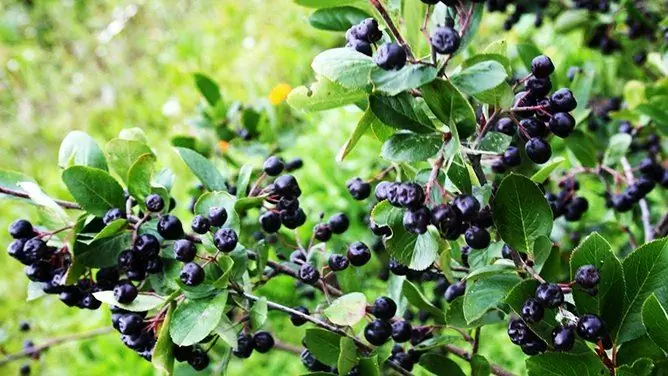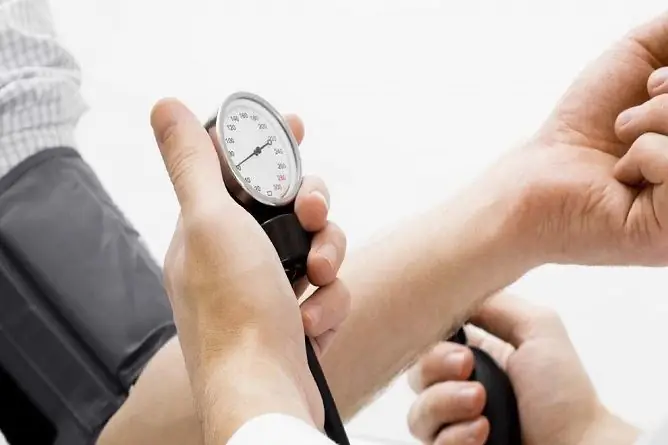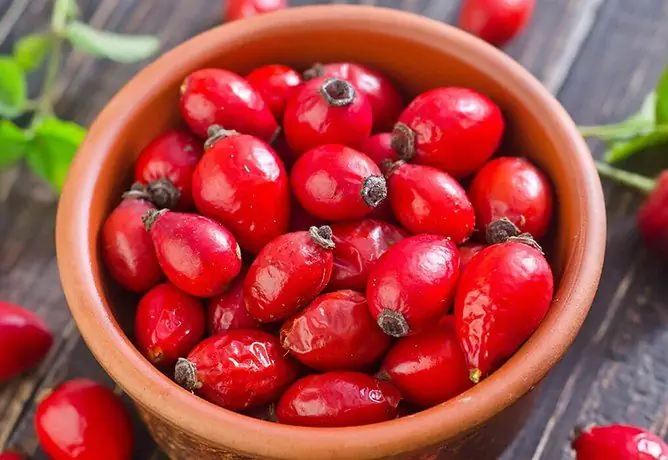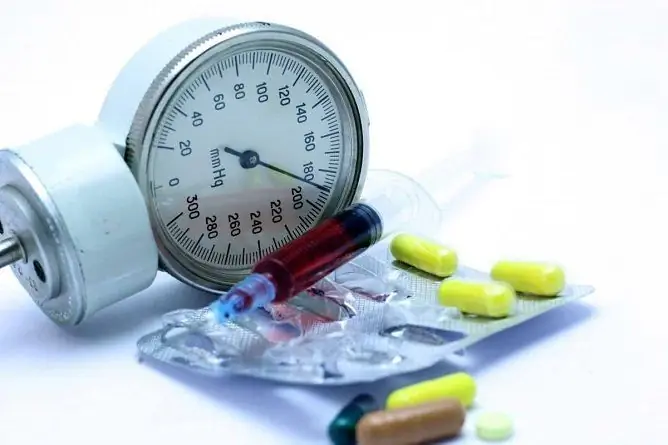- Author Rachel Wainwright wainwright@abchealthonline.com.
- Public 2023-12-15 07:39.
- Last modified 2025-11-02 20:14.
Does chokeberry increase blood pressure or lower it?
The content of the article:
- The properties of the chokeberry
- Chokeberry from pressure
- Chokeberry pressure recipes
- Video
Chokeberry lowers blood pressure, and is quite effective, therefore it is often included in the composition of antihypertensive drugs of traditional medicine. In addition to other medicinal properties, this plant has a beneficial effect on blood vessels, improves blood circulation, prevents the deposition of cholesterol on the walls of blood vessels, strengthens the vascular wall, restoring its lost elasticity, and has an antispasmodic effect. All these qualities give it a high value as an antihypertensive agent, but they also make it possible to use it in chronic hypotension - in this case, improving the condition of blood vessels and blood, chokeberry increases pressure.
The photo shows that this plant is also very beautiful, and therefore it is often grown for decorative purposes.
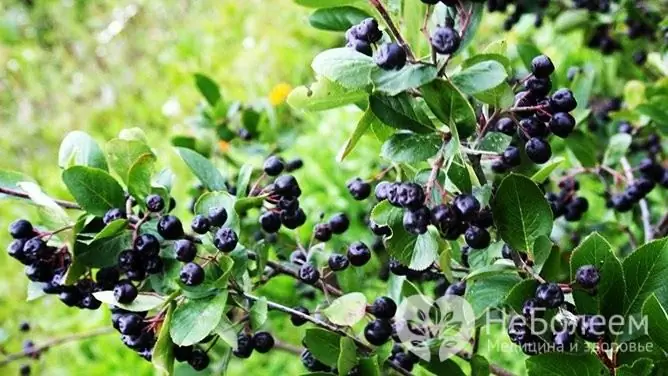
Aronia is a popular ornamental plant
The properties of the chokeberry
Black chokeberry juice (also known as black chokeberry, chokeberry) contains vitamins of group B, C, E, K, P, beta-carotene (vitamin A provitamin), iron, potassium, copper, iodine, boron, selenium, manganese, fluorine, fructose, glucose, sucrose, tannins. This allows the use of chokeberry as a vitamin, anti-infectious agent, in order to normalize metabolism, as well as for rheumatism and allergies.
Chokeberry juice has a hepatoprotective, diuretic and choleretic effect, prevents the formation of blood clots, helps to combat the effects of exposure to the human body of radioactive radiation, is used in the treatment of certain pathologies of the central nervous system, promotes the rapid restoration of damaged small-caliber blood vessels. With hypoacid gastritis, chokeberry can be used to increase the acidity of gastric juice.
For treatment and prevention, you can use not only fresh, but also frozen, dried blackberries, processed products (wine, compote, jam, jam, candied fruit, jelly), juice and leaves.
The main contraindications include increased acidity of gastric juice, intestinal atony, increased blood clotting. Before taking chokeberry-based products for hypertension, it is recommended to consult with your doctor.
Chokeberry from pressure
The most effective chokeberry at the beginning of hypertension and as a means of its prevention. Used regularly, in combination with lifestyle modifications and other antihypertensive methods (massage, exercise therapy, etc.), it can provide a stable remission without the need for drug therapy. In the later stages of hypertension, chokeberry is used as an adjuvant, allowing you to reduce the drug load on the body without losing the therapeutic effect (strictly after consulting a doctor).
It should be borne in mind that, like most other herbal medicine, the chokeberry does not have an immediate effect. The therapeutic effect occurs with its regular use over a long period of time, at least two to three weeks.
Chokeberry pressure recipes
To normalize high blood pressure, it is recommended to use ripe chokeberry berries in fresh and dried form, its juice and syrup cooked from it. To improve the taste during the preparation of medicinal products, you can add a little honey or sugar to them (not recommended for diabetes).
One of the effective antihypertensive drugs is the daily intake of 10 chokeberry berries daily for a month.
Chokeberry juice - pre-washed berries are dried, juice is squeezed out of them. If you don't have a juicer, you can use a blender to grind the berries in it and squeeze the juice through cheesecloth. It is not necessary to cook a lot of juice at once, since it loses its properties during storage. Take it two tablespoons 3 times a day before meals.
To prepare a hypotensive broth, a tablespoon of chokeberry berries is washed, poured with two glasses of hot water and boiled for one minute, then removed from heat and insisted for an hour. Take 0.5 cups 3 times a day before meals.
Another decoction recipe: boil a glass of fresh or dried berries in a liter of water for 10 minutes, cool, strain. Take 0.5 cups before meals. You can prepare a decoction of chokeberry and rose hips, in this case take 0.5 cups of berries from both plants.
Morse: Sort out two glasses of black chokeberry berries and rinse thoroughly, mash with sugar, let stand for 30 minutes, squeeze. Pour the pomace with a liter of water, put on a small fire, bring to a boil and boil for several minutes, stirring, then remove from heat and let it brew for 20-30 minutes. Then strain, add juice and honey to the broth. To enhance the hypotensive effect and enrich the taste, you can add a little lemon. Ready fruit drinks are stored in the refrigerator for no more than a day.
To prepare the infusion, 3 tablespoons of dried black chokeberry berries are poured into a thermos and poured with a liter of boiling water. Insist 3-4 hours, take 1/3 cup half an hour before meals.
Chokeberry syrup: boil 800 ml of water, put 1 kg of washed berries in it along with a few cherry leaves. Cook for several minutes, then remove the cherry leaves, add 15 g of citric acid and 600 g of granulated sugar to the broth. Allow to cool and brew (from several hours to a day), then put on fire again and boil for several minutes. Strain, pour the prepared syrup into pre-sterilized glass jars and roll up with metal lids. You do not need to remove the berries from the syrup, in this case, you get a healthy jam. With increased pressure, take 1 tablespoon of syrup 2-3 times a day.
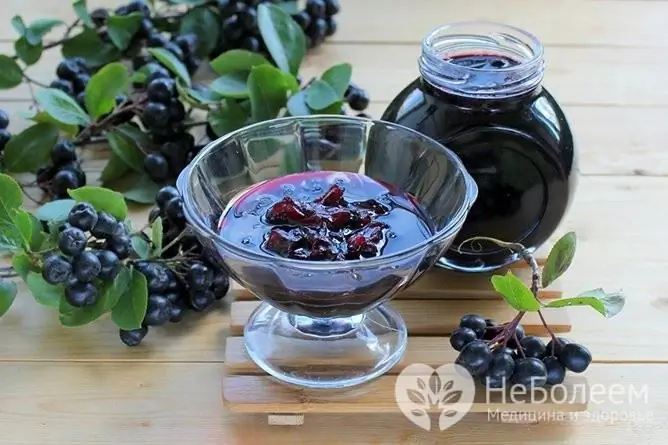
Aronia berries are used for medicinal purposes in any form: fresh, dried, processed
Chokeberry with honey: Rinse 50 g of chokeberry, dry and chop until puree, add a tablespoon of honey, mix thoroughly. Take a tablespoon 2-3 times a day, it can be used as a jam for tea (preferably green, and if black, then not too strong).
Chokeberry tincture: 500 g of berries chopped with a blender pour 0.5 l of vodka and leave for 10-14 days in a closed container in a dark place. Strain and refrigerate. Take 30 drops after meals.
Video
We offer for viewing a video on the topic of the article.

Anna Aksenova Medical journalist About the author
Education: 2004-2007 "First Kiev Medical College" specialty "Laboratory Diagnostics".
Found a mistake in the text? Select it and press Ctrl + Enter.

